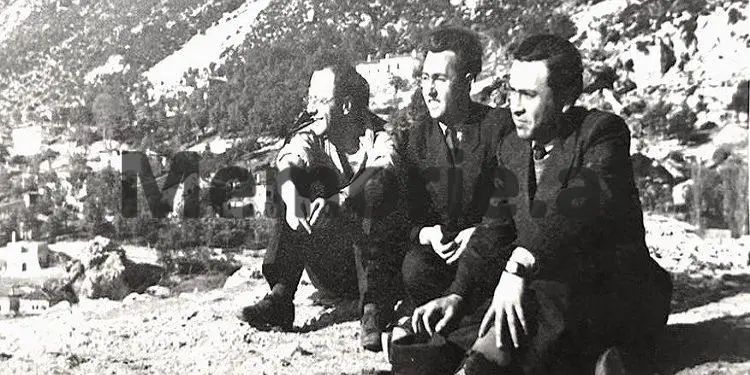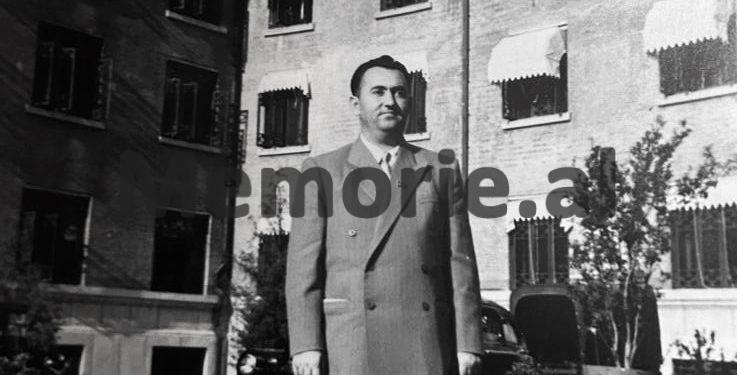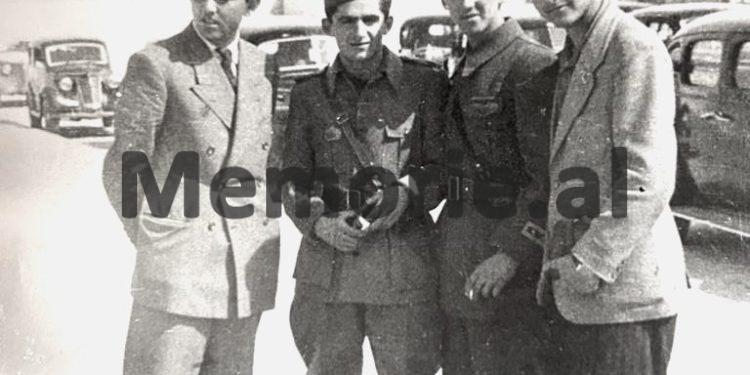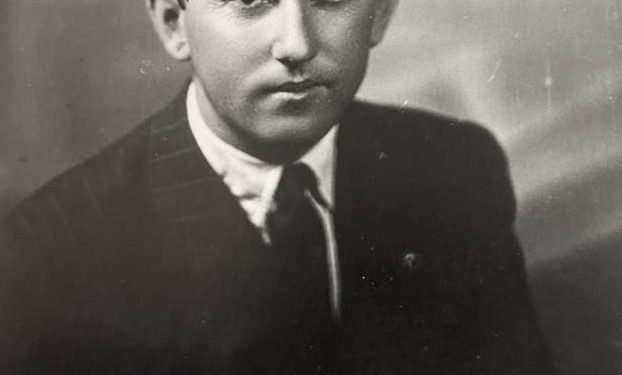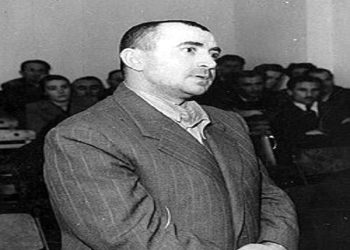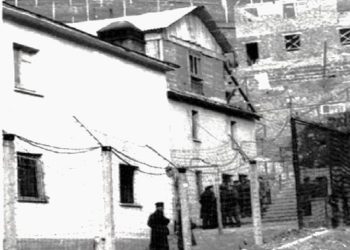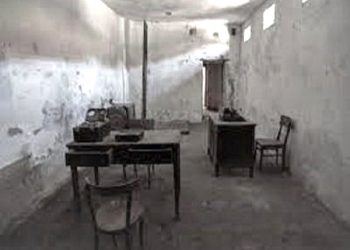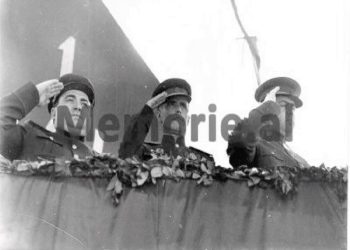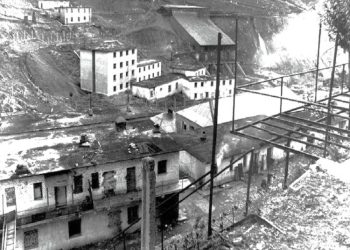By Fadil Paçrami
Part fifteen
Memorie.al / What is prison? It is the place where those who have been sentenced to deprivation of liberty are kept, we would say by reading any dictionary. But that is little. Prison and freedom – two opposites. Previously: what is freedom? In short: to be free means to do what you want, to think and act as you wish in the exercise and fulfillment of your freedoms and rights, as a person and as a citizen, but always without harming and violating others. . Again: to think and act. We are talking about democratic freedoms, from those of speech, press, assembly and organization in various parties and associations, ensuring the conditions where ideas, requests and human wills can find expression and concretization, from those of the biological-related plan with the being itself, to those of the social plan, related to the ways of living.
Continues from last issue
“During our cooperation with you, several times we found that you are quite subjective. This subjectivism has prevented you from listening and evaluating the opinions of others. In addition, you have been hindered and are hindered by your tendency to write plays…”! – At a meeting of the Secretariat of the Central Committee on February 9, 1966, among other things, he said:
“It is scandalous, friends, what is happening with Fadil, as the Minister of Culture and Arts. Yesterday I learned that work is being done to put his drama “The House on the Boulevard” into an opera. How is it possible to allow something like the Minister of Culture?! This drama is a piece of cake. How can a work like that made by Fadili be put into an opera, when operas have not yet been made for the brave who fell in the great struggle for the freedom of the Motherland, for the teacher who set up 45 schools in Mirdita and was killed by the enemies, for Skanderbeg, etc., etc. And Fadili allows us to make an opera, in a shameful way, about a girl why did she become pregnant”?!
The truth is different. At that time, such an opera was neither being worked on nor written or composed, nor had I heard or been aware that anyone was thinking of dealing with it. I remember that Mnaush Muftiu, at that time the deputy prime minister, who covered the cultural sectors, in a meeting after we had, asked me about this issue, without talking to me as it was raised in the Secretariat of the Central Committee of the PPSh. I told him that I don’t know anything, I don’t mind working against him, I will verify it and let you know.
And it turned out: a ballet master had thought that a ballet could be made on the basis of that play, but he hadn’t even talked, not with me, not with a librettist or composer, maybe with one of his friends and reported by the agency network. The road from an idea, to libretto, composition, approval to be staged, discussion, division of roles and start of work, is a long one. Everything, therefore, was something that had not been, but that expressed an anger that was beating somewhere else, caused by other motives. Leaving aside the appreciation of the drama and the understanding of what should be staged, this is a chapter in itself, to cry and laugh.
– From the middle of ’69, an anonymous letter was created, where accusations were formulated about an anti-socialist front in the field of culture and arts, which was created and operated, which I inspired. The years that followed were full of burdens and some of the most serious events that preceded the 4th Plenum and all that flowed from it. So, I will stay a little longer, certainly on some of them, the ones I called among the most important.
– In a meeting with writers and artists, in their club, Raqi Madhi, deputy director of the Institute of Marxism-Leninism, headed by Nexhmije Hoxha, gave a speech on the topic “Party and literature”. (It is not difficult to guess why this institute was included in the works of literature and arts, but I am not going to dwell further, because it is a separate issue). I was also there as a listener. It was noticeable that his entire speech was permeated by the idea of how the party has stood over the heads of the creators and hit the sacks of their bearers, who have acted in this field.
When it was over and the questions were about to start, I made this reply from the seat: ‘According to everything you said, the party has stood by the writers and artists with a stick in hand, is that what you wanted to say’?! For him and several others present, this was as unexpected as it was surprising. After two or three days, Ramiz Alia and Nexhmije Hoxha called me about this matter. I explained how and what had happened. Without finishing well, Nexhmija jumped in: “Yes, we have a relationship from Raqi Madhi, where he complains that your intervention was inappropriate and caused confusion, so let’s call him and clarify what the truth is, he is waiting in the office of him”, and made him stand up, to tell him to come. ‘One minute, – I spoke instantly, – you can do as you want, call him if you want, but I’m leaving, trust him, until my explanations don’t convince you. Others have been there as well’. I got up.
They asked me to stay and tried to convince me that there was nothing premeditated. I stuck to mine and added that; I was not with how he presented the issues, as if the writers have only made mistakes, not even with methods and actions like these. So he was not called and after a while I left. They stayed. I guess how and what they reported, but I say with conviction that I was right. As if this case was closed, it was not talked about anymore. But did it really close?
– Another case. After some time, someone from the apparatus of the Central Committee, dealing with culture, called me and told me something about the Union of Writers and Artists.
His intervention seemed out of place to me and I expressed that; don’t pay attention to the talkers of the corners and the corners and don’t beat them for everything, like a hammer on the heads of the creators and those of the League, that it is good to give up these bureaucratic ways and forms of work. This last word – bureaucratic, was the least that could be said at that time. He had reported to Ramiz Alia and before two days had passed, I was called to Hysni Kapo’s office, where Ramiz and Manush Mufti were also present. They asked me for explanations, emphasizing: “Don’t you mean by this that the apparatus of the Central Committee is bureaucratized”?! I talked about the specific case, why it happened and how I expressed myself.
Come in, Kapo pointed out that I had been summoned by order of Enver Hoxha. Ramizi intervened: “This is not the only case, there have been several so far.” At that moment I addressed you: you, Ramiz Alia, what do you have with me, why are you driving me, where is your problem, tell me openly?! He did not expect this, neither did the others? Hysniu came to his defense immediately, trying to calm me down. But I stuck to mine. A debate ensued. After a while, when I left, Ramiz came out with me and took me into his office. There he grabbed me by the neck and said: “What do I have to do with you, don’t even think about it”! What about this one? I said to myself. I sat for a while and came out. There are others like these, if you mention it, it would take a long time.
2.
So we come to the year 1973, the speech of Enver Hoxha, on March 15, the one at the 4th Plenum of the Central Committee and everything that followed, which I will talk about, staying on how it was said, what was published and how is the truth. I insist that much of what has been said and published in the “Works” of Enver Hoxha, for me and those around me, are neither issues nor events. How? Let me say my word, and then you will be judged. Only thus, through confrontation, can a correct opinion be formed.
I know that for many, this is still unacceptable, but does it have to be like this, forever?! We should not avoid the truths, much less hide them, even less oppose them. I do mine, if not soon, but one day people will be able to judge freely. I have written about certain issues before, in letters sent here from prison, certainly not so openly. (It is known that he did not tolerate objections, that his anger knew no bounds and that the consequences could be fatal).
At a meeting of the Secretariat of the Central Committee, speaking about the 11th Radio Television Song Festival of 1972, he goes further into what broke out on March 15, 1973: of the Central Committee of the Party, an issue, before I told Fadil Paçram himself. I was reported that when the meeting of writers and artists was held, to analyze the flaws of the work with a critical eye, Paçrami has stood up and, in a non- communist, said: “I have no responsibility for the festival. The Central Committee of the Party is responsible for this, because Radio and Television is a central institution”!
When I heard these words, I remembered the attack on the party and its leadership by the Yugoslav Trotskyists at the Tirana Party Conference. I do not accuse Fadil Paçram as a Trotskyist, nor as a man of Yugoslavia…! How is it possible that Fadili had no responsibility for those displays of liberalism that have appeared in Tirana?! Fadil Paçrami accuses the members of the party’s Central Committee apparatus of allegedly being conservatives.
To be precise, he didn’t call me or tell me anything after that meeting, as he said he would. Two moments are worth noting here: the first, he is forced to declare:
“I do not accuse Fadil Paçram as a Trotskyist, nor as a man of the Yugoslavs”, because he knew my attitude towards them well from then, before 1948 and after, and he did not want the stones to be harassed in that direction. The second, formulates the idea, for; “liberal show”, which puts everything at the root of how he handled the issue after a few days supposedly in an ideological plan.
– And so we arrive at March 15, when he openly launched a frontal attack against the democratizing tendencies, which he called liberalism, that appeared in those years in intellectual circles, which was felt more clearly, in literary and artistic creativity and in the student ranks, therefore he also gave the first blow in these directions, with the speech he delivered that day in front of the communists in the apparatus of the Central Committee, where he addressed me and the whole country like a madman.
“Some like Fadil Paçrami, and some others, were worried about knowing who is the main current danger, conservatism or liberalism…?! These friends want us to affirm that liberalism is not the main enemy. But this is thesis of the enemy. We ask the question: Are you with the theses of the party, or with the theses of the enemy?! All the way the events unfolded, the noise that started immediately with the movement of the party bodies, etc., made it clear that the word of this again, it was about something very serious. I had to face it, but always with dignity, defending my thoughts, all of which I called fair.
So the next day I asked him for a meeting, I wanted to talk face to face. He received me only after two weeks, when I insisted and repeated the request a second time. I went to ask for explanations and to tell him the truth. And this was the essence of the conversation from my side. However, the delay of two weeks and the pressure that was applied required submission. The text published later (Acts, vol. 50), as far as what was said in that conversation, is transformed, it does not reflect the truth.
His insistence was for me to accept, to self-criticize, as he repeated several times, to blame myself, sometimes speaking softly, to subjugate me, and sometimes arrogantly, for intimidation. I knew well both of these ways, which constituted the two sides of him, as a character of the type of Shakespeare’s Richard III. I understood that he needed this, to prove that everything was as he said: that the country’s party was really threatened by a great danger – and this dog of liberalism (and when? At a time when conservatism, sectarianism and isolation from the world, they were busy). He also needed to face and defeat that wave of dissatisfaction, which had begun to rise against the road where the country was introduced. He also needed to show that he would punch anyone, and at all levels, so any opposition, as it had happened other times, also happened afterwards. He needed it, therefore, to carry through to the end the plan he had and which was revealed earlier, in the years that followed.
Other than that, I couldn’t do it. I knew for a long time the methods and practices in such cases: after he broke with self-criticism – and he sought this as deeply as possible, once, two or three times, and then, he gave the kick. Not only my statements and answers are not as presented in the published text, but also other people’s names, which were not even uttered in that meeting. Apparently, they were collected and added later, when the issue was raised in the grassroots organizations. This is clear, even from what he says; “All these things that I am mentioning to you came out to me from the minutes of the meetings.” Which meetings, those after the 4th Plenum of the Central Committee?! Because from March 15, when that criticism was made open to me, until March 30, when that meeting took place, I don’t know that there was a meeting of the grassroots organizations. But even if it had been done, when and how could they have reached, within 15 days, the minutes from them, in his hands?!
That he remained dissatisfied and angry, it is clear from the whole published text and he did not say things like this: “If you round up the issues like this, if you do not explain them directly and honestly, but speak in an academic tone even before to me, that the party has entrusted me with the task of the first secretary of its Central Committee, you certainly find it difficult to correct yourself. You remove yourself as a theorist and think that you can speak theoretically, but don’t round things off.”
The other sayings that follow are also presented in this way at will. But one thing is true: I can no longer walk as before, not only in the field of literary and artistic creativity, where progressive tendencies and opposition to a reality that was weighing on the country were more open, but also in others. The youth, too, especially the students, displayed them more openly and boldly. So, it was also shot hard in these directions. The fear was that these trends, which were called “liberalism”, would spread in all areas, and on a national scale. -On May 15, 1973, in a meeting of the bureau of the Party Committee of Elbasan, it was stated as follows:
“In literature and the arts, there have been manifestations of anti-proletarian liberalism and modernism, supposedly innovative tendencies, to distort the line, support and groupings by Fadil Paçram and Todi Lubonja, of a number of liberal and declassified elements, tendencies to spread decadent currents in literature, music, theater, painting and elsewhere”.
And he continues: “The revisionist tendency of these elements, not on the party road, has aimed at the degeneration of the youth, of the students, so that they become the support of their hostile work”. All this was taken even further to the 4th Plenum of the Central Committee, with the report that was held there by Enver Hoxha and was entirely devoted to this issue, where such untruths as this and others were said: “Creative development of socialist realism, has also encountered some wrong interpretations and theorizations of different origins.
Especially these have appeared in the treatment of the problems of contradictions and the hero in art. It has happened that the contradictions of our society are presented without a way out, with a dark sense of pessimism, which is typical for bourgeois-revisionist conceptions…! This leads to serious errors of principle, where Fadil Paçrami tried to insert our art, when he said that until now we have dealt enough with the war “between us and the enemies”, and from now on, we must talk mainly about the war “between us “.
One statement, another for another. Indeed, in the preface, under the title: “Two words”, for the drama “The House on the Boulevard”, I have said, I adhere to this opinion even today: “In our scenes, the historical theme ruled and the conflict remained mainly in; ‘us and the enemies’, as if today’s topic, with the conflicts; ‘between us’, did not promise a stage”! There is, therefore, a difference, the question is not put: either – or, but also – and. However, precisely this: the treatment of conflicts “between us”, I am afraid: the discovery of contradictions, the war of opposites, digging into the negative phenomena that coexist, and they were not few. So, he calls it the greatest danger that threatened literature and the arts and hits him so hard. To me, this is an honor, but creativity was harmed. The following continues:
“Fadil Paçrami has had foreign views on these problems, in opposition to the party line, which have also appeared in his literary creativity. With his pronounced literary pre-dispositions, with foreign theorizations, he… encouraged and supported the spread of the influences of foreign modernist performances”.
Why am I mentioning these, and am I taking a little longer? Because I am no longer the way I was treated and the way I was accused, when everything is talking about necessarily unrealistic developments, not only in the field of literature and the arts, but also in other areas that could be discussed, useful conclusions are drawn for the country even today. Late, but better late than never, tomorrow will be more painful.
They are revealed even more clearly: either some of the rational ideas of the time should have been taken into consideration but were opposed and labeled as “isms”, in any way: either the confusing dogmatic and sectarian thoughts, which close the paths of development; even the ways of treatment full of lines, and the arrogance in the defense of something not clean, in the closing speech in that plenum. Memorie.al
The next issue follows





